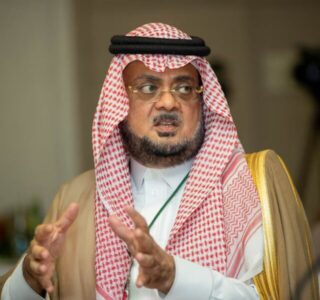Talks to tackle desertification will kick off in Riyadh on Monday, the first time the UN’s Convention to Combat Desertification Cop, or Cop16, will be held in the Middle East.
Desertification linked to climate change is on the rise and land degradation affects nearly 40 per cent of the planet and the lives of more than 3.2 billion people.
While Cop29 may be the most widely covered of the UN climate talks, Dr Osama Faqeeha, Saudi Arabia’s Deputy Minister of Environment, Water and Agriculture, told The National that Cop16 needs to move up on global the agenda because “it is not getting the global coverage and attention it deserves”.
The UN says investment in nature-based solutions must increase more than twofold, to reach at least $542 billion by 2030.
Dr Faqeeha wants businesses to pick up the pace and fill the finance gap to tackle the effects of drought, and sought to highlight the economic cost to the global economy.
“We’ve already had land degradation causing the economic loss in the order of $6 trillion per year,” he said.
“Many people think combating desertification is a challenge for arid countries. This Cop is about conserving land and preventing it from being becoming a desert, prevent it from degrading until it becomes a desert with a very low ecosystem.”
Cop16, from December 2 to December 13, together with the UN Convention on Biological Diversity (CBD COP16) held in Columbia and Cop29 this month in Azerbaijan come under secretariats of the Rio Conventions adopted by governments in 1992 to achieve sustainable development goals.
What’s on the Cop16 agenda?
One of the key aims of Cop16 is to prompt action. At present, 130 countries have specified land degradation neutrality targets but Dr Faqeeha said there was still much work to be done.
“We still have a sizeable number of countries accounting for 45 per cent of the global area that has yet to announce targets,” he said. “Many are even prominent developed countries. So this really needs to change.
To move the agenda forward, the first two days of Cop16 will feature ministerial dialogue on drought resilience and finance, as well as the impact of land degradation and drought on forced migration and security.
“In Riyadh, parties are also expected to move from pledges to concrete implementation on land restoration,” said UNCCD executive secretary Ibrahim Thiaw. “Finally, Cop16 will help us understand that land loss and water scarcity have a human face.”

Land degradation and desertification are exacerbated by urbanisation, overfarming and the impact of climate change. In an interview with The National, Dr Osama said nature-based solutions that reduce pressure on land can be a way forward. “We already have the Saudi green initiative to restore 40 million hectares of degraded lands.” According to Dr Faqeeha, 100 million trees have been planted and 240,000 hectares restored.
Wastewater treatment methods are being used in Saudi Arabia to restore degraded land. Cityscapes are a significant contributor to land degradation. Cities consume 75 per cent of the planet’s resources, produce over half of its global waste, and account for at least 60 per cent of greenhouse gas emissions.
With over two thirds of the world’s population expected to live in cities by 2050, transforming urban areas into greener spaces could help prevent desertification.
In the UAE, the government has a number of initiatives such as the National Biodiversity Strategy, the National Strategy to Combat Desertification 2022-2023 and the Blue Carbon Project to combat desertification. The Ministry of Climate Change and Environment is using drones to map the country’s 38,000 farms and gain an understanding of how to restore degraded land, as well as protect and develop existing agricultural zones.



